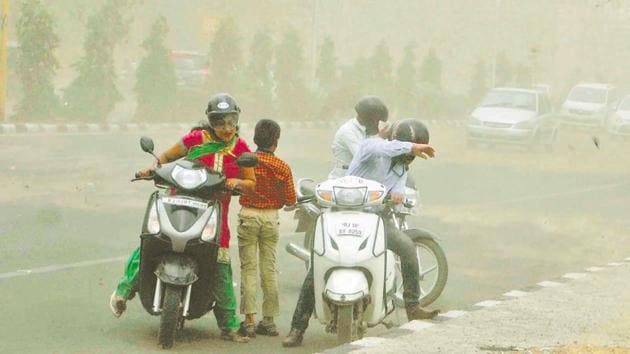Rajasthan to focus on climate change with new action plan
In 2012, the government drafted the Rajasthan Action Plan on Climate Change (RAPCC) but it remained a draft – never circulated and never came into effect.
Thirty-six years ago, Rajasthan set up the directorate of environment (DOE) to reduce vulnerability and build resilience to climate change impacts, but it remained only on paper and the directorate never became functional.

In 2012, the government drafted the Rajasthan Action Plan on Climate Change (RAPCC) but it remained a draft – never circulated and never came into effect.
Now, the government is renewing its focus on climate change and has announced to restructure the directorate and make a new action plan.
“The impetus for this is the need to initiate a dialogue on climate change in the state and to sensitise all wings about the urgent need to assess the carbon footprint of all our policies,” said Sreya Guha, principal secretary of the environment department.
This also follows an order by the National Green Tribunal (NGT) in April this year for creation of an environment cell having qualified and experienced environmental experts, under the chief secretary of Rajasthan for compliance of Solid Waste Management Rules, 2016.
Chief minister Ashok Gehlot announced restructuring of the DOE as Directorate of Environment and Climate Change (DOECC) in the budget for 2019-20 on July 10. He also announced drafting a new state action plan for climate change with Central government funding.
The state government has spoken to the Union ministry of environment, forest and climate change for this, said Guha. “The process of consultation on the plan will begin next month,” she added.
Climate change is the greatest global challenge, which through a multitude of impacts poses a risk to our ecology, economy and society. Studies show that changes in the climate of Rajasthan are over and above the natural climate variability prevailing in the region. Experts say that Rajasthan falls in areas of greatest climate sensitivity, maximum vulnerability and lowest adaptive capacity.
“Water resources in the state are scarce and have a highly uneven distribution both temporally and spatially. The state also has the highest probability of drought occurrence in the country. A threat such as climate change thus calls for a relook at our policies and actions to reduce vulnerability and build resilience to likely climate impacts,” said DN Pandey, secretary of the environment department.
According to the government proposal for the directorate, it will be primarily responsible for assessment of environment trends in the state, analysis of the need of government intervention for protecting and improving the environment through appropriate programmes and policies. It will render policy advice to the government on administration, economic, fiscal and market-related governance mechanism.
The DOECC will have three cells: environment, administrative and IEC. “After the budget announcement, the next priority is to get it on ground with logistics and recruitments. Twelve new positions will be filled with direct recruitment or deputations,” Pandey added.
“The government’s decision to focus on climate change is welcome but it needs to work on a convergence plan that takes into account indigenous knowledge of people and applies a scientific approach to tackle issues of climate change,” said Dr Alok Vyas of the Centre for Community Economy and Development Consultants Society (CECOEDECON ), an NGO working on cliat mate change for a long time in some Rajasthan districts.
For the last two years, farmers in the state have started talking about climate change, he said. “They say dharti ko bukhaar aa gaya hai but realise the problems arising because of irregular and scanty rain due to climate change,” he added.
Rajasthan’s profile
Being the largest state, Rajasthan has unique vulnerabilities in terms of exposure to climatic extremes and varying capabilities for responding to the likely risks.
Rajasthan has only about 1% of the country’s water resources, and the average rainfall in the state is 574 mm as compared to the all-india average of 1,100mm.
According to a 2014 report by the Aajeevika Bureau, a nonprofit organisation that works with migrants, an estimated 5.79 million people from rural areas in Rajasthan turn seasonal migrants. Western Rajasthan, which receives the lowest rainfall (102.57mm) statewide and is most prone to drought, sends the largest number of migrants. Migrants also come from the fertile alluvial soil rich and forested southern Rajasthan as forests are cut down for mining and other extractive activities, the report said.
“People in the rural areas talk about reduced and erratic rainfall, groundwater depletion and soil depletion as the most common reasons for migration,” said Abha Mishra of Aajeevika Bureau.
It is projected in a range of studies that climate change will lead to a decrease in crop and animal produce aggravating the risk of hunger, malnutrition and poverty, said Suyash Anand, a research scholar of Geography OPJS University in Churu in his research paper in Indian Journal of Applied Research in February 2018. “There is a decrease in grain yield of wheat in Rajasthan at the rate of 2.49 quintals per hectare per degree rise in seasonal temperature, and the annual loss in milk production due to heat stress is 98.65 litres per animal in crossbred cows,” he wrote.
Earlier efforts
After setting up the directorate of environment in 1983, the state formulated a Climate Change Agenda for Rajasthan (CCAR) in 2010. The same year, the State Environment Policy (SEP) was announced to identify the key environmental challenges that the state must address to ensure continued sustainable development and economic growth that is equitable.
This was followed by the Rajasthan Environment Mission to bring into focus the high priority issues emerging from the SEP and CCAR. In 2012, the Rajasthan Action Plan on Climate Change (RAPCC) was made to build on the key areas as identified under the CCAR by prioritising urgent areas of action in a phased and time-bound manner and is in coherence with the Rajasthan State Environment Policy and Environment Mission.




